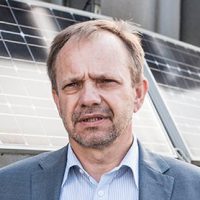Treffen Sie die kommunalen Mitarbeiter

Tomasz Bońdos
Energy Manager for the City of Bydgoszczy (Poland)
My goal is to coordinate the energy and climate policy of the city and develop strategies and plannings to ensure the energy transition. I manage a team of 7 experts with whom we develop projects aiming at reducing the electricity, heat, and gas consumption in the public sector of the city while increasing the share of energy from renewable energy sources in the energy balance.
Communication skills are a must since I’m working with hundreds of people both in the city and external. I of course need numerous technical, financial, legal skills to fully understand the projects and the legislation and be precise in the work I do. Finally, as energy manager, I also need to be stress-resistant and creative to overcome barriers (including limited staff capacities) and provide solutions to any hard to solve issues.
I very much appreciate to have an impactful, meaningful and at the same time exciting job as my days are totally unpredictable: I never know the new challenge I am up to! Working with great and committed people is also a great asset, many individuals I worked with are today friends of mine.
For the energy transition to happen, cities need to have people dedicated to it. Cities need energy and climate experts’ team to have the time to think the transition and act. The whole process is long but when I see the long-term effects of my actions – that’s the most rewarding feeling compensating all the hard work done.
Zwischen 2022 und 2030 werden wir im Durchschnitt 6 000 zusätzliche Arbeitsplätze pro Jahr benötigen, wie in der EU.

Charlotte Petit
Project manager in charge of the heating networks for the City and Eurometropolis of Strasbourg (France)
My aim is to develop and distribute renewable heat on the territory of the Eurometropole of Strasbourg. In particular, I create calls for tender for the exploitation, improvement and/or extension of our heat networks. I also take part in the Eurometropole’s reflections on shifting towards new sources of renewable heat.
First of all, I have technical knowledge of renewable energies and the operation of heating networks. I also need organizational and legal skills to draw up call to tender in conjunction with the city’s services, and financial skills to develop projects and envisage solutions that are both viable for the climate and at an acceptable cost for inhabitants. Finally, I have to communicate and educate in order to discuss heating networks with the inhabitants and subscribers of the heating networks, the network operators and my colleagues within the Eurometropole.
What I like most is being able to make a concrete contribution to the energy transition on the scale of the Eurometropole. I work with my colleagues from other departments (urban planning, territory…) to offer a solution that has an impact on the fight against climate change and is also affordable for users. I find myself in this collective dimension of the district heating and the work at Strasbourg Eurometropole.
All cities and municipalities, including some that are more rural or smaller, may need a collective solution like heat networks to decarbonize their buildings. It is therefore essential to have a position similar to mine in all cities to coordinate this development and identify synergies at the local level.
Zwischen 2022 und 2030 werden wir im Durchschnitt 38 000 zusätzliche Arbeitsplätze pro Jahr benötigen, so wie sie in der EU.

Marco Costa
Public building decarbonization officer for the Energy and Sustainable Development Agency Modena (Italy)
The goal of my job is to help municipalities implementing their energy and climate action plans and achieving their objectives for public buildings decarbonization. Concretely, I analyze public buildings energy data, perform energy scans, and report possible actions to municipalities to help them defining a retrofitting strategy. I also support them in engaging with stakeholders and citizens to become active actors in the energy systems, for example by setting up energy communities involving public buildings as hubs for renewable energy generation.
Technical skills are essential. I have an energy engineering background, necessary to understand energy systems and simulation tools, assess data and develop strategies. I also need relational skills as I deal with many kinds of stakeholders, from officers in administration to local politicians. I need to understand their needs and visions and be pedagogical to explain what is realistic for their municipality to be realized.
Finally, a basic knowledge of the existing financial schemes and regulations is needed to help municipalities understand opportunities and boundaries, interpret call for tenders and EU projects.
What I love the most is working for the public side. I find meaning in my work contributing to deliver projects and strategies that improve local communities’ conditions. It is always rewarding to see the impact of my work in cities’ administrators’ feedbacks. I also enjoy a lot working on many different topics. In a week, I can work on some very technical tasks, close to my engineering background, as well as talking to a pool of mayors while helping them reflecting on their municipal energy strategy.
Nowadays the energy cost is so big for cities, that it represents a big chunk of their municipal budget. It is essential to have a public building decarbonization officer focusing on saving energy, therefore money, and reducing the carbon impact to align with European goals.
Moreover, it is very important for local administrators to lead by example in order to better engage their citizens in the energy transition. In this regard, it’s pivotal the role of a dedicated officer to deliver effectively public projects and support citizens providing the right information they need.
At the same time the consultancy role of public energy agencies like AESS is crucial, and I believe our work is complementary with municipal climate and energy staff. We do support them by offering an external and objective perspective as well as a long-term vision setting support, helped by the fact that we have the necessary distance from the day to day and most pressing issues.
Zwischen 2022 und 2030 werden wir im Durchschnitt 6 000 zusätzliche Arbeitsplätze pro Jahr benötigen, wie in der EU.

Isabel Serrano
Energy Advisor of Green Office service of Consorci de la Ribera (Valencia Region - Spain)
The aim of the „Green Office“ service that we provide in our municipalities is to advise families on how to reduce their energy bills, to advise them on how to reduce their energy consumption and to promote renewable energy in the municipality.
The tasks are diverse, our work consists of seeing in a more individualized way the energy bills of the family, advising on cheaper energy tariffs, whether they have the option or not to the social bonus and checking and carrying out the procedures, as well as advising on consumption habits and possible existing subsidies for energy rehabilitation, installation of renewable energies, …
The energy advisor is a relatively recent figure that has arisen due to the introduction of new energy production and consumption systems in the market. This technician has to know both the existence of existing products and services and the suitability, ease and viability in the acquisition and installation of energy solutions in homes and buildings because there is a great variety and diversity of energy sources. Therefore, the advisor must know how to carry out a preliminary study of consumption and detect the most effective installations as a premise to achieve the desired goal.
Being able to provide a service to the public that is currently lacking in the private sector.
Citizens need to be guided and informed by a close technical advisor about the existing energy solutions and/or alternatives. This is key to implement the change of paradigm foreseen in the energy transition policies, respect the environment and make citizens benefiting from energy savings.
Zwischen 2022 und 2030 werden wir im Durchschnitt 40 000 zusätzliche Arbeitsplätze pro Jahr benötigen, so wie sie in der EU.

Christoph Schmidt
Urban planner and Energy analyst for the city of Munich (Germany)
The goal of my job is to support the development of a secure, climate-neutral, renewable energy supply for the City of Munich from the urban planning perspective. The City of Munich wants to be climate-neutral by 2035. I know that this is a very ambitious goal, but I want to contribute to its achievement by providing the best analysis of energy consumption data of all buildings to develop strategies for the decarbonisation of existing and for the construction of new buildings.
In my job, I need skills from many different disciplines to understand different perspectives. For example, I need to know how energy companies and energy supply systems work and understand at the same time the needs and worries of tenants and house-owners about retrofitting. It is important to be diplomatic and convincing. I also need GIS (Geographic Information System) skills to collect and analyse energy data of all kinds of buildings in the city and knowledge of political and legal framework conditions, especially energy-related and urban planning legislation.
My job is never the same. Every day of my job is different and something unforeseeable can happen all the time because I work on so many topics at the same time. I also like to meet many people to exchange ideas. Sometimes you need perseverance, but it usually pays off in the end.
It is important to start the transition of our energy supply systems on all levels immediately. All cities need a position like mine to ensure that all existing buildings and the energy sector are decarbonised and that all new buildings have the lowest impact on the climate and environment. Climate change is one of the main challenges that we are facing. We have no time left. People who bring together knowledge from different disciplines to develop integrated planning approaches are the key to a successful transition.